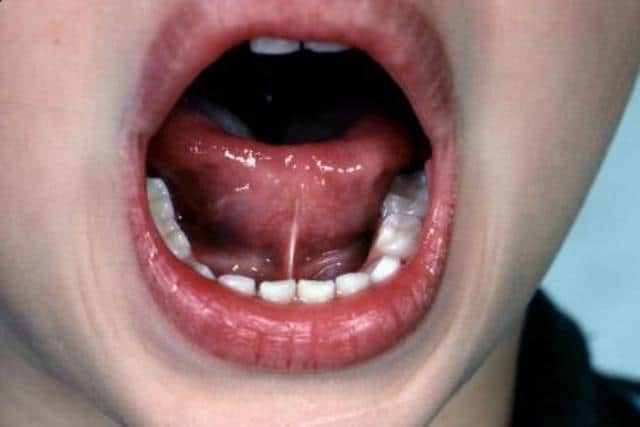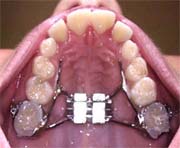 |
| A kid with a tongue tie. |
I’m not a big interventionist, and I don’t hold much trust in the medical establishment. I don’t rush to the doctor for every little thing, and I think far too many people jump into doing surgical procedures that not only could be avoided, but often do more harm than good.
That said, I’ve elected to have minor surgical procedures for not just one or two, but all three of my kids. Lee had his tongue tie and lip tie snipped, Ike had his tongue tie snipped, and Anneliese had her lip tie snipped just yesterday. Why would I, as a mom, choose to do elective medical interventions and choose to put my kids through pain, not to mention being willing to pay money for these surgical procedures?
I guess to answer this, I’ll have to start at the very beginning.
My Kids’ Tongue Ties and Lip Ties
When Lee was born, nursing hurt at first. Of course, everyone “knows” that nursing usually hurts, right? But I dunno, something just didn’t seem right. It really, really hurt, and it didn’t seem normal.
When the docs came around and were telling my roommate in the hospital that her baby had a tongue tie, I listened carefully, then asked the doc “So does my baby have a tongue tie also?” They took a quick look, and then said “No, doesn’t look like it” and then went.
But when nursing was still painful 3 weeks later, and on top of that I got engorged and got mastititis because Lee wasn’t managing to empty out my breasts from milk, I paid a visit to a lactation consultant who affirmed what I had originally thought- Lee certainly did have a tongue tie, and that was why nursing hurt so much- he wasn’t able to get a proper latch and flattened my nipple like a pancake while nursing.
At the recommendation of my lactation consultant, I took Lee to a dentist in the area who specialized in correcting tongue ties. The dentist asked me to open my mouth real wide, peered in, and said “You have a tongue tie.” He then looked at my husband’s mouth and said “You also have a tongue tie! Tongue tie is genetic generally; its very likely that all your kids will end up with tongue ties.”
 |
| I always thought this stretch of skin from my tongue to the bottom of my mouth was normal, then I found out that no, this was a tight frenulum and was a tongue tie! |
Me? A tongue tie? What’s that? I never noticed anything odd about my mouth… My mouth looked “normal” to me. I mean, it was no different than my mom’s mouth, my sisters and brother’s mouth, my dad’s mouth, or my husband’s mouth. Of course, I discovered at that point that everyone in my family has a tongue tie, as does my husband, which is why what I thought was normal was in fact, not.
According to the dentist, Lee also had an upper labial frenulum, also known as a lip tie, and for a nice fee of 75 dollars cash, the dentist snipped them both. The procedure took less than a minute total, required no anasthesia or stitches, and the dentist instructed me to nurse as soon as he was finished, and by the time the nursing session was over, there was no blood in sight. And might I mention that nursing was a breeze thereafter; all the pain disappeared, and we had a nice long nursing relationship until Lee was 19 months old and I was 5 months pregnant with Ike.
 |
| Lip tie. Note the skin between the gums and the lips. |
By the time Ike was born, I was prepared already with the knowledge of what a tongue tie felt like and looked like, and I was able to diagnose him with a tongue tie at one day old, while still in the hospital. Because of that, I was able to get the top surgeon from the children’s ward the floor below to snip Ike’s tongue tie at 2 days old, and again, we had no problems with nursing because of that, and I saved myself the cost of the tongue tie snipping (especially since the dentist raised his price for the snipping to 150 dollars!)
When I was pregnant with Anneliese, I was pretty sure she’d also have a tongue tie, and I was even considering going back to the hospital to give birth just because of the ease of having the tongue tie snipped at 2 days old, not to mention it being free, but in the end I decided to go with a homebirth and just write off the cost of tongue tie snipping as another homebirth related expense. I’m glad I didn’t choose to have a hospital birth for that reason, as Anneliese was my first kid without a tongue tie; she did have a lip tie which my local family doctor snipped yesterday, in about 30 seconds.
 |
| Anneliese’s mouth post tongue tie snipping. Note no flap of skin between the gums and the lips, only a bit of redness where it used to be |
From readers here, I learned that a tongue tie is actually somewhat related to a cleft palate, and can possibly be connected to dietary issues, but I don’t know. I suspect that my diet change (cutting out gluten for most of my pregnancy with her) helped me absorb nutrition better and helped her mouth develop better but I don’t know for certain.
So, now you know how I got my kids lip ties and tongue ties snipped, but I still haven’t explained why I did it. The reason I’m sharing this is because tongue tie snipping and lip tie snipping actually are beneficial to your health, and to your pocketbook, and that is why it’s something I strongly recommend people do, even if you think you can manage without it, and that is why I would have been willing to pay cash to get a tongue tie snipped- a little money spent now to save a lot of money in the long run.
What is a Tongue Tie, Really?
Open your mouth and lift your tongue. Either look in the mirror or feel with your finger- is there a flap of skin attaching your tongue to the bottom of your mouth?
This flap of skin is called a frenulum, and many people have it. This is referred to as a tongue tie when the frenulum is attached more towards the front of the mouth and tongue, and isn’t just in the very back, as this generally “ties” the tongue to the bottom of the mouth and impedes mobility of the tongue.
Depending on the severity of the tongue tie, some people may not be able to extend their tongue outside their mouth much, if at all.
Many people with tongue ties have their frenulums stretch somewhat as they get older, allowing their tongues more mobility, which is why I, even with a tongue tie, can nearly touch my nose with my tongue.
What problems are connected to tongue ties?
One of the first and foremost problems connected to tongue ties is breastfeeding issues. Many babies with tongue ties can’t get a proper latch and hurt the mother, and may not stimulate the milk to come in properly. Many mothers whose babies have tongue ties give up breastfeeding right from the start, or stop after a little bit when their milk dries up because milk production works by supply and demand, and a bad latch can cause milk production to drop once its no longer regulated by the post birth hormone rush.
My siblings all had tongue ties, and we all, every one of us, had problems with nursing. My mother’s milk dried up between 3 months and a year for all of us, and that was with pumping to keep up her supply.
Being able to nurse your children long term for a decent length of time (at least until a year old, ideally until 2 years old) is very beneficial for your children’s long term health, not to mention pocket book, as breastmilk is much, much cheaper than formula (even once you factor in the cost of a pump and bottles if necessary, tongue tie snipping, and a lactation consultant).
Assuming you weren’t planning on breastfeeding, or if the baby’s tongue tie isn’t causing problems with nursing, are there other reasons to get the tongue tie snipped? Absolutely.
Tongue ties very often cause speech impediments, because they cause problems with tongue mobility. Once I learned this, it really comes as no surprise to me that my sisters, brothers, and I all had speech issues and needed to go to speech therapy to work on those. (I had a minor lisp which went away with therapy, my siblings had problems pronouncing the “sh”, “ch”, “g” ,”j”, and “r” sounds- and I’m sure there are other ones I’m forgetting.) Not surprisingly as well, the siblings with the worst tongue ties also have/had the biggest speech issues.
Speech issues can cause self esteem issues, and may cause problems socially for your child, and may cause problems later on in the work place.
Taking care of these speech issues with speech therapy is time consuming and may be expensive, depending on your insurance and the availability of speech therapy in your location.
Ok, but assuming your child doesn’t have speech issues, or if you don’t think speech impediments are enough of a reason to do a surgical procedure, albeit a minor one, are there still other reasons to get a tongue tie snipped?
Yes.
When a person has a tongue tie and their tongue’s mobility is limited, his tongue doesn’t generally rest against the roof of his mouth- his palate, which almost always means that the person ends up with a really high and narrow palate instead of a flatter and wider palate. The reason for this is because a tongue pressing against the palate naturally widens it; something that doesn’t happen with people with a tongue tie.
So, what’s the issue with a high palate?
Teeth issues. Big ones. Namely not enough room in your mouth for all your teeth.
I was 8 years old the first time I went to the orthodontist. My parents took me because my teeth looked scary, I had “monster teeth”, teeth pointing every which way. My older sister had the same. My parents played no games with our teeth, as the cause of our very crooked teeth were because we had overlapping roots. My dad’s cousin, Art, had the same teeth issues, severely overlapping roots… which caused all of his teeth to fall out by the time he was 18; he lived with dentures for the rest of his life. My parents wanted to take no chance of that happening to us, so I was in orthodontics from a very young age.
 |
| Palate spreader to widen a narrow palate |
The reason the roots of mine and my sister’s teeth were overlapping was because there was no room in our really small mouths for all our teeth. To make more room in our mouths, we had palate spreaders, which we widened every day gradually by means of a little key, and day by day, our jaws grew wider and our palates lowered somewhat. This made space in our mouths for our teeth, so our roots no longer were overlapping, and with the help of braces, we finally had straight teeth.
I actually ended up getting a palate spreader two times, the second time in high school, because my palate was still too small. After all this, my palate is actually quite wide, and I have more than enough room in my mouth for all my teeth, including all 4 of my wisdom teeth which I still have (and therefore was able to avoid oral surgery to remove them).
My husband also has a really narrow, high palate… and I’m sorry to say, his dentist was a bit of an idiot. (I don’t say this lightly; every dentist Mike has been to since has commented what a terrible job his previous dentists did and how they really messed up my husbands mouth to the extent.) Instead of widening my husband’s palate, this dentist just pulled out a bunch of my husband’s teeth so there would be less crowding, and they were the wrong teeth to pull. Nearly 10 years later my husband is paying for this dentists’ blunder with pain and other mouth issues that need extensive dental and orthodontic work to fix, numbering in the thousands of dollars, which we can’t afford to fix, unfortunately.
Tongue ties causing high narrow palates end up costing thousands upon thousands of dollars to fix via orthodontics and other dentistry, issues that need to be taken care of not just for cosmetic reasons, but to be able to keep your teeth…
Lee and Ike are the first people in my family to have their tongue ties snipped, and they’re the first ones in my family to have wide palates, with nice spaces between their teeth. There of course is no guarantees of anything, but as their palates are already low and wide, there is little likelihood they’ll need orthodonture in the future, and I am pretty sure I can attribute that to them having had their tongue ties snipped.
High palates also narrow the sinus cavities and can cause tremendous sinus issues for those who have them. Myself, my mother, and my father all had chronic sinus issues and my parents still have them.
I don’t remember the exact reasoning behind it, but tongue ties and high palates are also linked to thyroid and other hormonal issues.
ETA: Weston Price’s Observation and Tongue Ties
Interestingly, Weston A. Price, the dentist behind the “real food” movement, also had something (ok a lot) to say on wide palates vs narrow palates. From his research, he discovered that people who follow a traditional foods diet high in nutrition and low in pesticides, etc, generally have a wide, low palate, as opposed to today’s high and narrow palates, and have “malocclusion”, a bad bite.
This bad bite and high arches can be the cause of so many different health issues that you wouldn’t have thought to connect either.
Are you a nose breather, or a mouth breather? I breathe through my mouth, always have. (It caused problems when I was getting orthodontics done- I was always told to breathe through my nose when they were taking a mold of my teeth, but I couldn’t, and I’d end up breathing through my mouth and gagging on the mold and they’d have to repeat it too many times…) You’re really not supposed to breathe through your mouth- we’re built to be breathing through our nose all the time, but when you have a high palate, your nasal passages are much smaller, which makes it less easy to breathe through them.
Most people with high palates tend to be mouth breathers. Mouth breathing causes sleep apnea and snoring.
According to Raymond Silkman, a wholistic dentist, breathing through your mouth is a chronic distress signal to your autonomic nervous system; people who mouth breathe tend to
“live with a kind of permanent tension, and chronically experience a sense of being on “high alert” from their amped-up sympathetic nervous systems. The resulting mild to major systemic anoxia (lack of oxygen) has a negative effect on every cell in the body, and has been further linked to chronic anxiety, certain types of headaches, hypertension, reduced heart rate (bradycardia), blood-clotting dysregulation, enuresis (bedwetting), and chronic nose, ear and sinus infections.” (From here.)
There also apparently are strong connections between mental acuity (IQ), ADHD, OCD, Tourettes, Autism and Aspergers, hearing issues, and TMJ.
According to Weston Price, this type of problem is related to the diet in the Western world. What I wonder is- can this be because a bad diet causes tongue ties? Could the reason Anneliese wasn’t born with a tongue tie be because my diet was different (and better) during my pregnancy with her than it was with my pregnancy of my boys? Could the reason why tongue ties appear to be genetic be because people in the same family tend to eat similarly; one person cooks for the entire family, and the next generation tends to learn to cook from their parents and then often cooks a similar style?
I wonder if tongue tie clipping together with the type of diet recommended by Weston Price is actually best to correct the high palate and the issues that come along with it, and that one without the other can help, but the two together would be most effective once a kid is already born with a tongue tie…
So, why do I get my kids’ tongue ties snipped?
Because if I try to avoid this intervention and expense now, my kids will likely have further health issues down the line and need to have even more painful and expensive interventions than the 30 second tongue tie snipping now.
Well, what about lip tie?
Yea, this was my dilemma for the past little while. What about lip ties? I know with certainty that I’d snip any tongue ties my kids would have, because the alternative is worse, but it was much harder to find out what exactly the problem is with a lip tie.
The first bit of information I found about lip ties is that when a kid has a lip tie, often they have a hard time latching on when breastfeeding, as their lip curls down instead of going upward like it is supposed to do while nursing, but even with Anneliese’s lip tie, she was able to nurse fine, and it’s been pretty smooth sailing. (Ok, it hurt the first 2 weeks somewhat, but once her lip tie stretched out a bit, she was able to nurse no problem.)
With nursing not an issue, what was the problem with a lip tie? Any reason to snip it?
The next bit of information I found on the topic was that lip ties generally cause a gap in the front teeth, and while this is cute in little kids, it can be embarrassing and less “cute” looking in adults; many people want braces to eliminate this gap. Personally, I don’t know if I’d pay for braces for something that is just cosmetic and not a health concern, so snipping a lip tie to avoid paying for braces definitely sounded appealing to me. But… I still wasn’t sure. Do I put my kid through a minor “surgery” for merely cosmetic reasons? I mean, shouldn’t I give my kids a choice if they want an elective cosmetic “surgery” done?
I was really torn, going back and forth in my mind, unsure whether it was wrong to do a medical procedure for entirely cosmetic reasons, when a lactation consultant friend, who knew I was searching for reasons why lip frenectomies (snipping frenulums) are done, sent me a link that talked about the topic, and it mentioned the reason that finally convinced me 100% to get it done.
When a kid has a lip tie, the lip stays pretty close to the front teeth all the time, and little particles of food tend to get trapped there, which leads to tooth decay. Basically, lip ties can mean the kid gets lots of cavities in their front teeth, and since I already have so many teeth issues with my kids, and as it is, I’m torn what to do about those cavities, I decided that if I could do a minor procedure that would make my baby less likely to need fillings when she’s older, then I’d do it.
And so yesterday, I got Anneliese’s lip tie snipped, it took all of 30 seconds, entailed no anasthesia (the doc had me give her a specific amount of tylenol beforehand) and the most she cried was actually when the doctor was holding up her lip to take a better look- it seemed like that bothered her more than the snipping itself. The doc held the cut with a gauze for 15 seconds, after which there was virtually no more bleeding.
The doc said that with older kids, when you get a lip tie or tongue tie snipped, there is much more pain and much more bleeding, and it requires stitches. With little kids, its practically painless and bloodless, fortunately. (Cost me nothing, by the way; my insurance covered it fortunately.)
So there you have it.
Why I, the generally anti medical interventonist mom elected to have minor oral surgery on all 3 kids of mine so far, and recommend that anyone who’s kid has a tongue tie or lip tie get them snipped, even if you think your kid will be fine without, because it’ll most likely help prevent medical issues in the future, not to mention likely save you a lot of money. Of course, can you really call it surgery if it involved nothing more than latex gloves, a few pieces of gauze, a pair of medical scissors and 30 seconds?
Do you have any experience with tongue ties or lip ties with your kids? Did you opt to get their tongue ties or lip ties snipped? Why or why not? Did you have to pay cash for it or did your insurance pay for it? How old were your kids when you got it done?
Do you or anyone in your family have a tongue tie? Do you have a little flap of skin between your tongue and the bottom of your mouth? If so, did you have any breastfeeding issues, speech impediments, need orthodontics, have sinus issues, or thyroid issues?
If you had to go to speech therapy, had a palate spreader, or have chronic sinus issues, pick up your tongue and feel for a flap of skin underneath. Do you have a tongue tie, possibly never diagnosed?
Do you or any of your families have the health issues mentioned in the Weston Price section, including AD(H)D, Autism/Aspergers, Tourettes, sleep apnea, chronic anxiety, tension headaches, hypertension, bradycardia, bed wetting issues, etc? What do you think about what he says about the connection?
Does your family follow a traditional foods diet, and were you following one before your kids were born? If so, do your kids have tongue ties?
Do you or any family members have lip ties? Do you have a gap between your front teeth or lots of cavities in your front teeth?
After having read this info about tongue ties and lip ties, if you had a kid with a tongue tie or lip tie, would you have it snipped? Why or why not?
Linking up to Fat Tuesdays, Traditional Tuesdays, Real Food Wednesday, WFMW, Frugal Days Sustainable Ways, Simple Lives Thursday, Frugal Friday, Freaky Friday, Monday Mania, Homestead Blog Hop






0 Responses
Have you been tested for the MTHFR mutations?
It's an amazing article in favor of all the web people;
they will obtain benefit from it I am sure.
It's an amazing article in favor of all the web people;
they will obtain benefit from it I am sure.
I have a tongue tie and getting the surgery in a couple of months is the procedure painful?
I have a tongue tie and getting the surgery in a couple of months is the procedure painful?